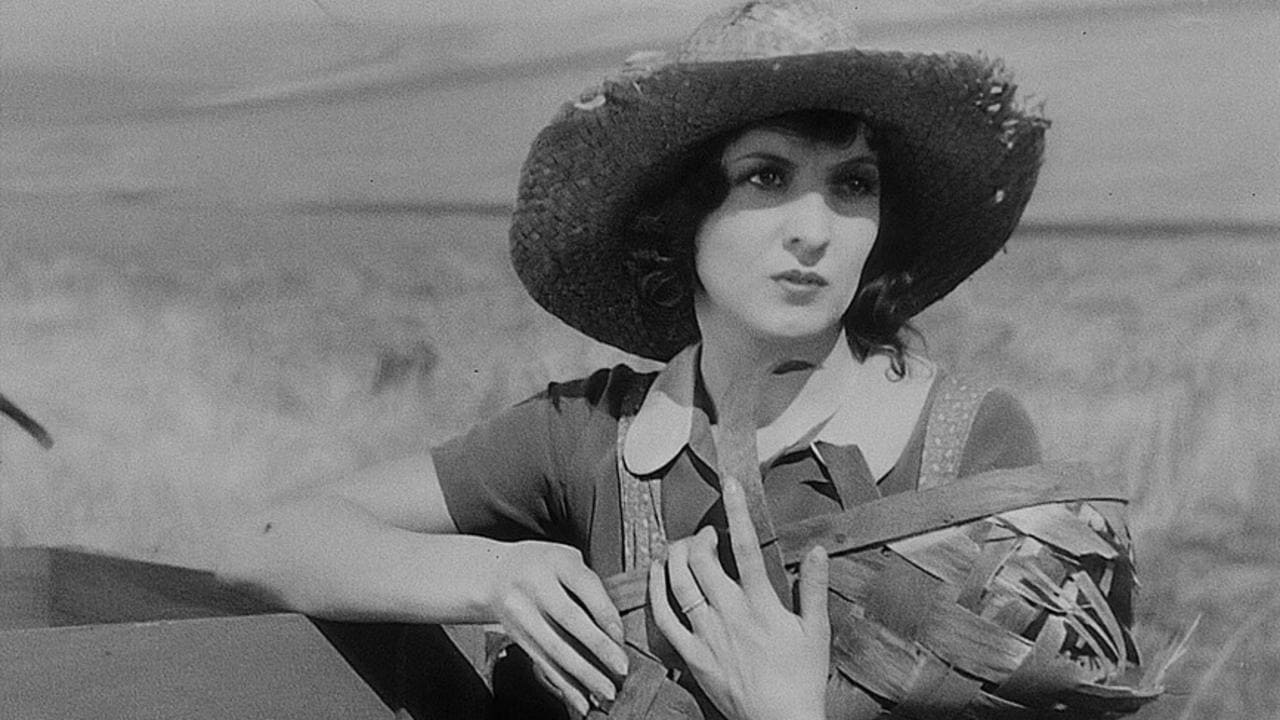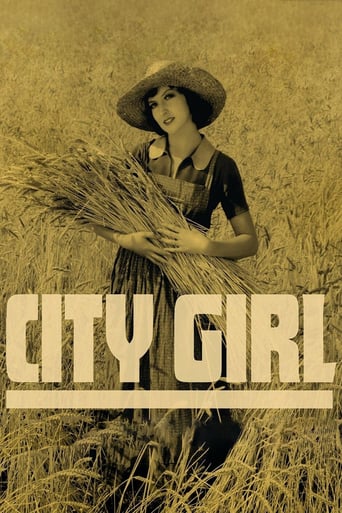

Charming and brutal
... View MoreThe performances transcend the film's tropes, grounding it in characters that feel more complete than this subgenre often produces.
... View MoreI think this is a new genre that they're all sort of working their way through it and haven't got all the kinks worked out yet but it's a genre that works for me.
... View MoreYes, absolutely, there is fun to be had, as well as many, many things to go boom, all amid an atmospheric urban jungle.
... View MoreCopyright 10 January 1930 by Fox Film Corporation. U.S. release: 16 February 1930. 8,217 feet. 91 minutes. SYNOPSIS: A farm boy arrives in Chicago to sell his father's wheat crop, falls for a waitress, marries her and takes her home to Minnesota. His father does not approve and tries to come between the boy and his bride.NOTES: Filmed as a silent-fortunately Murnau's original cut of the movie survives-City Girl was then considerably tinkered with by studio management in order to turn it into a part-talkie, with disastrous results. The stage play opened on Broadway at the Bijou on 20 August 1925 and ran a modestly successful 52 performances. Helen MacKellar and Buford Armitage starred; Willard Mack directed.COMMENT: Beautifully filmed, superbly acted (particularly by Charles Farrell and Mary Duncan) romance of the wheatfields, the silent version is available on an excellent DVD from Grapevine Video. The city scenes are so startling in their impressionistic (but nonetheless hectic) pace, which all comes to a charming coda when the lovers meet, we wonder what Murnau is holding in reserve to beguile us back on the farm. We're not kept long in suspense. After a lyrical introduction as the lovers run through the wheat fields, we are brought down to earth when miserly in words, deeds and manner David Torrence comes back on the scene. How these three clashing personalities resolve their differences is worked out forcefully, if a little melodramatically, but nonetheless in a satisfyingly picturesque manner, thanks equally to the consummate skill of F.W. Murnau in staging, the engrossing acting of the principals, and the superbly lit camerawork of Ernest Palmer.
... View MoreI liked the acting, the cinematography, you could tell the director knew what he was doing. I just didn't like the story, too many clichés, no twist was unpredictable, If someone gave you just the premise (boy marries girl in the city and move to the country to help his father on the farm) you could probably guess every major plot point of the entire film. Maybe the things in this movie weren't as well-known tropes like they are now, but it kind of made me dislike the movie just seeing how overdone everything in the movie was. Would have given it a higher score otherwise, the story just brought it down.
... View MoreFor his Hollywood debut, 'Sunrise' (1927), F.W.Murnau famously had built an enormous set depicting a city to emphasise the impact of its size upon his visitors from the country. In 'City Girl' we see Chicago as experienced by a native inhabitant: rushed, hot and cramped. It's the country that seems vast when she steps off the train with her new husband; her first view of her new home resembling a painting by Andrew Wyeth.Unfortunately there's also her ghastly new father-in-law to be reckoned with, played by one of the terrifying Torrence brothers, David; an ornery old brute, who quickly clashes with the new arrival, leading the viewer to wonder who will murder who.The storyline is pretty basic and resolved suspiciously abruptly, but as one would expect from Murnau, the film looks magnificent, moves along lickety split, and the acting is first class (it's interesting to see among the youthful farmhands later western perennials Guinn Williams and Jack Pennick). The mood and milieu recalls Victor Seastrom's 'The Wind', and both call upon the elements to resolve their plots with a bang; in the case of 'City Girl' with a gathering hailstorm that contrives to make the bruising human conflicts that have preceded it seem trivial by comparison.
... View MoreSilent film may be the only unique art form ever to have flourished and then become extinct. The great ironyindeed, tragedyof its demise is that it reached its peak only in the last few years before the talkie revolution. Silent films from 1927 through 1930 dazzle with their fluid and sophisticated mastery of visual storytelling; the last thing they need is dialogue. F.W. Murnau's City Girl is a perfect example of this artistry, and what happened to it. The follow-up to Murnau's legendary masterpiece Sunrise, City Girl was made during the waning days of silents, and in a concession to the changeover to sound it was re-cut before its release and given a recorded score featuring singing farmhands. Not surprisingly, the hybrid film sank like a stone. Miraculously, an original silent print survived and was rediscovered in the vaults at 20th Century-Fox. I first saw it at the National Film Theatre in London during a Murnau retrospective. I'd never heard of it, but when I went to see Nosferatu the speaker introducing it added, "Be sure to come back next week and see City Girlit's better than Sunrise!" This claim would be very hard to defend, but while lacking the transcendence of Sunrise, City Girl is in some ways a more complex and interesting work.It also defends the honor of city girls from the laughably caricatured vamp who causes all the trouble in Sunrise. Like the earlier film, City Girl deals with the clash between urban and rural values, but here the countryside is no more pure or wholesome than the city. Unlike the vague, timeless setting of Sunrise, City Girl's milieu is the contemporary American Midwest. Kate (Mary Duncan) is a waitress in a busy Chicago lunchroom who lives in a dreary tenement and dreams of escaping the city. She meets Lem (Charles Farrell), a naïve and sweet-natured farm boy who has been sent to the city to sell his family's wheat crop. They fall in love, marry, and set out for the wheat-fields. But Kate's dreams are shattered by Lem's harsh, tyrannical father (David Torrence), and she finds herself waiting on rowdy, leering farmhands who are even worse than the lunchroom customers. Kate loses faith in Lem when he is unable to stand up to his father, and the marriage appears to be over almost before it began, until a series of melodramatic events force the various characters to examine their true motives and feelings.Every aspect of this story is expressed through visual details. We are introduced to Lem on the train to Chicago, eating hand-packed sandwiches, oblivious to the flirtations of a vamp across the aisle whose interest is aroused by his bankroll (we know right off this isn't going to be Sunrise II.) We see Kate sassily quashing passes from customers ("What do you do in the evenings?" "YOU'LL never know!") and we see her in her dingy little room, watering a pathetic dusty flower on the fire-escape and listening to a wind-up mechanical bird while the El rushes past the window. The sweaty, chaotic bustle of the lunchroom is captured with tremendous verve. Once the scene moves to the country, the symbolism of wheat becomes the heart of the film (which Murnau wanted to call "Our Daily Bread.") In a ravishing scene, the newlyweds run through a glistening, swirling field of grain; when they arrive at the house, Lem's little sister greets Kate with a bouquet of wheat stalks. When the dour father enters, he rebukes her for wasting their cash crop; to him grain only means money. He also notices that Kate has put her cloche hat down on the family bible, and he is convinced that she's a floozy who sees Lem as a gravy train.The Torrence brothers, David and Ernest, specialized in hissable nastiness, but here David's worried, American Gothic face conveys the hard life that has turned this man into a monster. It's hard to believe he could be genetically linked to a sweet-faced, curly-haired cutie like Charles Farrell, but he does make Lem's anguished weakness believable. Mary Duncan is perfect as a feisty yet vulnerable working girl, a type that would become much more common in early talkies. Duncan left the screen in 1933 when she married a polo player named "Laddie" Sanford. She lived to be 98, but her retirement was Hollywood's loss. I would like to see this intelligent, natural, black-eyed actress in something else.City Girl is marred by an ending that feels rushed and unconvincing, but it raises interesting, at times troubling themes concerning marriage, traditional gender roles and family relationships. The most poignant aspect of this exquisitely directed film is not that it was one of the last silent movies made in Hollywood, but that its director would die in a car crash just three years later, at the age of forty-two. That was cinema's loss.
... View More